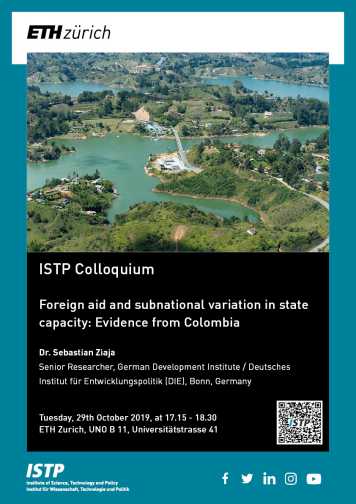Colloquium: Dr. Sebastian Ziaja
Tuesday, 29th October 2019, at 17.15 - 18.30
ETH Zurich, UNO B 11, Universitätstrasse 41
Foreign aid and subnational variation in state capacity: Evidence from Colombia

Some foreign aid projects are aimed at strengthening state capacity by providing technical support to recipient administrations. Others build parallel structures for public goods delivery, which has been argued to relieve the state of domestic pressure to perform and thus to undermine endogenous capacity building. Which mechanism prevails, and under which conditions? The answer to this question is crucial to assessing the net benefit of foreign aid in general. Nonetheless, no rigorous assessment of the relationship has been published so far. One reason for this literature gap is the inability of most comparative approaches to take local context into account. State capacity varies substantially between capital and periphery, but the vast majority of state capacity indicators is only available at the national level and thus blind to subnational variation.
This talk argues that we require data with subnational variation to assess the impact of foreign aid on state capacity. It presents an approach for measuring variation of state capacity within countries that can be applied across countries by combining a large number of indicators using a latent measurement model. The model shall calibrate indicators across space and time and deal with a large amount of missing data. The resulting indicator of latent state capacity is combined with geocoded aid commitments provided by AidData that differentiates by aid sectors such as health and government aid. Preliminary results using data for Colombia over the period 2005-2017 are presented.
About Dr. Sebastian Ziaja
Sebastian Ziaja is Senior Researcher at the German Development Institute / Deutsches Institut für Entwicklungspolitik (DIE) in Bonn. Before moving to Bonn, he was interim professor for political science at the University of Konstanz and post-doctoral researcher at Heidelberg University. In 2014, he obtained his PhD at the Government Department at the University of Essex. His research centers around political regimes and state capacity. In substance, he investigates international determinants of these issues, with a special focus on foreign aid. His methodological emphasis is on measuring regime change and subnational variation in state capacity.
You can read a Summary of the Colloquium Talk on our Reports page.